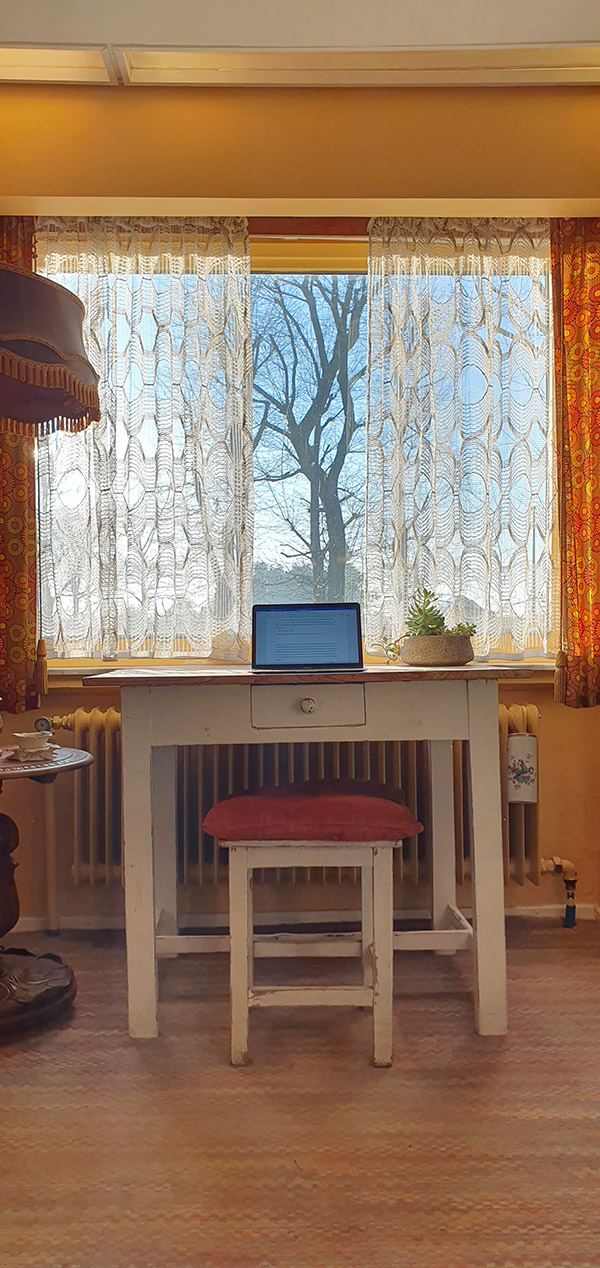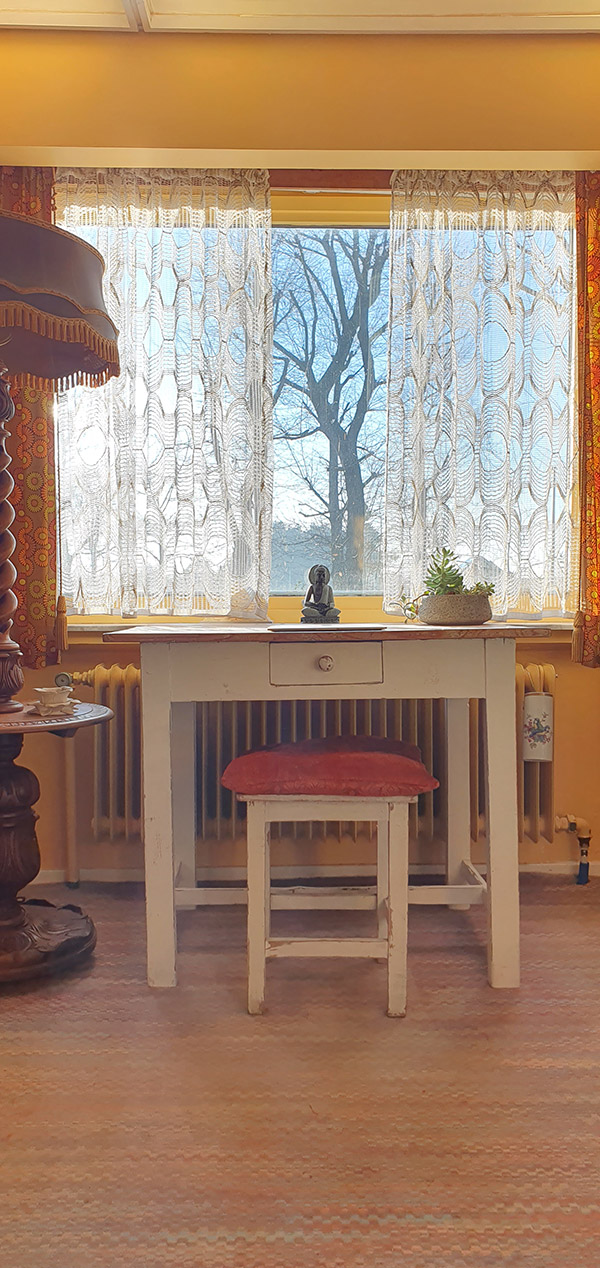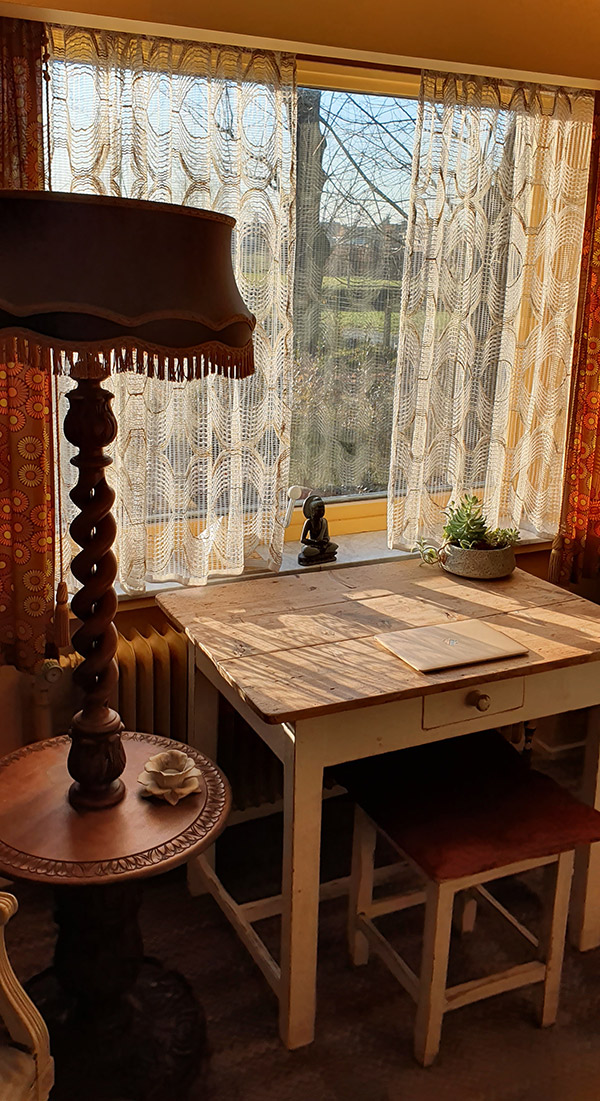Jeanie Keogh’s Writing Space
By Jeanie Keogh
“When I’m working late into the evening, I can watch the sunsets that the Flemish painters captured so well as the light dies out over my garden. The landscape connects me to the ebb and flow of the seasons (which often matches my writing process), and the view somehow helps me to weed out scenes that are not useful and shed unnecessary exposition like the oak trees do their leaves in fall.”
For the first time in my life, I write in a home office. There has always been a designated “space” for writing, but it was always just a makeshift desk – an antique Singer sewing machine table in the living roof of a loft in Brussels, a kitchen table made by a woodworking boyfriend in Vancouver, my mother’s roll-top desk in rural Ontario. Now I have an entire room dedicated to writing with a big painter’s table. It faces a big window that looks out onto the front yard in the East Flemish countryside, also a first. In the winter, the view is of sheep grazing. In the summer, corn grows up and blocks the view of the sheep. On the rare winter days that Belgium is not overcast, the office gets an explosion of afternoon sun which lights up the 70s-yellow walls. When I’m working late into the evening, I can watch the sunsets that the Flemish painters captured so well as the light dies out over my garden. The landscape connects me to the ebb and flow of the seasons (which often matches my writing process), and the view somehow helps me to weed out scenes that are not useful and shed unnecessary exposition like the oak trees do their leaves in fall.
When my husband and I first checked out this mid-century modern home, the office was what sold us on it. It was lined on either side with books belonging to the recently-deceased owner – Franz Meert, a 90-year-old writer – who had lived in the house all his life (and who, according to an esoteric friend of mine, has not yet left). I loved the smell of his old rotting and yellowing Dutch paperbacks.
When we first moved in, I stayed away from the office for a while out of a sort of superstitious respect for the dead (his presence, my friend said, could mostly be felt in that room). Now I’m squatting (with his permission) and borrowing him as my muse from time to time.


The office is my man cave and the space is under creative copyright.
I don’t keep any books on the built-in bookshelves (those are in the living room on display – my husband has arranged them with his designer’s eye for balance and beauty). Instead, the shelves are kept as bare as the (inevitable) accumulating paperwork allows. As for furniture, there is a big mahogany lamp, a couch that can become a single bed, and a Victorian chair. There is nothing on the walls except a Japanese Buddhist scroll and a dream catcher that our dog ate all the feathers off of. When I sign my first book publishing contract, I hope to add an Alison Watt painting (either South, Octavo, or 1708) as a reminder never to fear the blank page.
The couch serves as a place to do my hard copy work – read, research, edit printed drafts, organize notebooks, review feedback from my writers’ group. I try to keep it so that my desk is the only place where screen time takes place. Sometimes I spread out manuscripts on the floor.
Although my deadline-driven journalism background has trained me to write wherever and whenever, my creative writing space is about defining my boundaries – both psychically (from Franz’s sometimes distracting energy) and physically, ie. not letting the space turn into a place to store the vacuum, bike equipment, or guitar amps. A world-class chef would never let people leave bags of baby clothes or folded laundry in his/her kitchen, so I’m not going to let the office become a place to dump things that don’t fit in the garage. There is also a proportional relationship between clutter in the room, and chaos in my mind. A space full of knick-knacks is like a run-on sentence with too many adjectives. If my office space isn’t treated with respect, then no one (least of all me) will take my writing seriously, and I’ve worked very hard on my inner demons to make sure that writing is not just a hobby.

Jeanie Keogh is a Canadian living in Belgium. Her fiction and creative non-fiction has been published in Filling Station, Fiddlehead, Grain, Room, The Puritan, Freefall, Broken Pencil, Riddle Fence, Matrix, and Room.
Photos courtesy of Jeanie Keogh.

